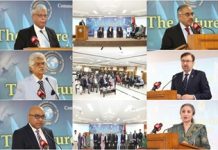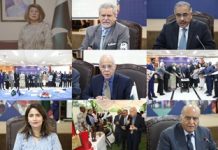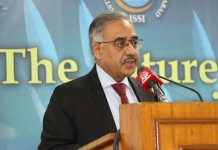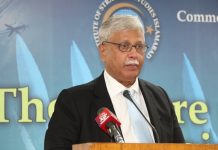Remarks by DG ISSI Ambassador Sohail Mahmood at the International Conference on “Strengthening Pakistan-U.S. Relations”
ISSI, 24 July 2024
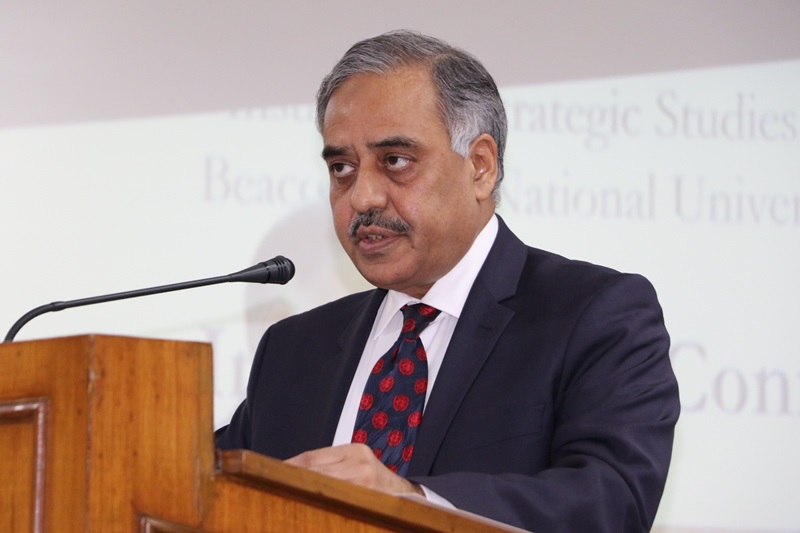
Ambassador Donald Blome, U.S. Ambassador to Pakistan,
Ambassador Mariam Aftab, Additional Secretary (Americas),
Ambassador Khalid Mahmood, Chairman BoG, ISSI,
Excellencies,
Eminent Speakers,
Distinguished Participants,
AoA and good morning!
It is indeed a great pleasure to welcome everyone to the Institute of Strategic Studies for this International Conference on “Strengthening Pakistan-U.S. Relations’, organized by ISSI in collaboration with the Beaconhouse National University, Lahore. I commend the efforts of our respective teams led by Ambassador Mansoor Khan and Dr. Neelum Nigar.
We are privileged to have a group of very distinguished speakers in the conference – including diplomats, practitioners, academics, and policy experts. Given their vast knowledge and experience, and strong interest of our other participants, we look forward to a deeply insightful and productive exchange of views.
It is also a privilege to welcome Ambassador Donald Blome again to the ISSI. For more than two years, he has personally spearheaded the efforts on the U.S. side to place U.S.-Pakistan relations on a stable, energetic and multi-dimensional trajectory. We thank you, Ambassador Blome, for agreeing to be the Keynote Speaker today and look forward to your address.
We are also delighted to welcome Ambassador Mariam Aftab, Additional Secretary (Americas), representing the Foreign Secretary, who got called by the Prime Minister. Her presence here testifies to the Foreign Ministry’s keen interest in our deliberations.
As we are all aware, Pakistan-U.S. diplomatic relations go back more than 7 decades. From the outset, the United States has figured prominently in Pakistan’s foreign policy considerations. The relationship over the past 77 years has been rich, intense, and at times also dramatically fast-paced. The United States has been an important development partner, a key trade and investment partner, and a valuable security and defence partner. But – owing to a variety of factors – the relationship has not witnessed a steady, linear growth. It has been more of a roller-coaster ride.
Bilateral relations have largely followed a cyclical pattern – marked by phases of close engagement, punctuated with times of palpable estrangement. Pakistan has had the dubious distinction of being the “most allied ally” as well as the “most sanctioned ally” of the U.S.
Historically, there have been four distinct features of the relationship. First, it has been significantly shaped by external factors, including regional and global developments. Second, it has had a narrower base, primarily security-centric. Third, it has lacked longer-term stability and sustainability. Fourth, negative mutual perceptions at the public level have posed a constant challenge.
That said, it is also true that whenever the two countries have worked closely together, both Pakistan and the U.S., and the world, have benefited. Three clear instances can be recalled in this regard: First, the role played by Pakistan in facilitating Sino-U.S. rapprochement which tilted the East-West balance decisively in favour of the free world led by the U.S. Second, joint endeavours in rolling back the Soviet invasion of Afghanistan, which culminated in the end of the cold war. Third, the post-9/11 robust counter-terrorism cooperation that helped substantially dismantle Al-Qaeda.
The present is, however, different from the past. It is widely acknowledged that the Pakistan-U.S. relationship is at another historical crossroads. Changed bilateral dynamics, evolving regional situation, and rapidly transforming global geo-strategic landscape are determining the breadth and depth of mutual engagement between the two countries.
On the bilateral plane, the main thrust of cooperation has shifted from security to other areas in view of some objective realities and evidently changed U.S. priorities. While CT remains an area of convergence, security serving as the anchor of the relationship is no longer the case, at least for now. There is more emphasis on enhanced trade, investment, energy, IT, climate change, education, culture, and people-to-people exchanges. This new emphasis is also in sync with Pakistan’s pivot to geo-economics and conception of comprehensive human security.
On the regional plane, U.S. troop withdrawal from Afghanistan in 2021 decreased the level of overall U.S. engagement as well as commitment of diplomatic, economic and military resources in the region — with corresponding effect on Pakistan-U.S interactions. Nonetheless a peaceful, stable and terrorism-free Afghanistan remains a point of convergence between the two countries.
On Pakistan’s eastern side, the pursuit of ‘Hindutva’ ideology by the BJP-RSS dispensation, the continuous upgradation of U.S.-India strategic partnership, and the assigning of the role of ‘net security provider’ to India within the ‘Indo-Pacific’ construct, have unleashed new dynamics. Pakistan remains concerned about the detrimental effect on its national security due to the far-reaching military enabling of India with provision of advanced weapons and critical technologies by the U.S. that continues apace. Islamabad has a fair expectation that Washington should be more responsive to its legitimate security concerns while building up India’s capacities as a presumed ‘counter-weight’ to China.
At the global level, the major-power contestation has its own implications for Pakistan. As a strategic partner with China, and a long-standing friend of the U.S., Pakistan wishes to have close ties with both and to navigate the complex dynamics of U.S.-China relations as nimbly as possible. It has no appetite for bloc politics. Pakistan would like the U.S.-China competition to be managed responsibly — as they have themselves committed — and in fact see both sides constructively engaged rather than drifting towards rivalry and conflict. The world would benefit enormously if the key driver of U.S.-China relations remains cooperation, rather than confrontation.
The U.S. approach towards the developments in the Middle East, especially the heartbreaking situation of Palestinians in Gaza, is also causing profound concern and distress to the people of Pakistan. This further compounds the issue of perceptions and undermines public support for our partnership.
Distinguished participants,
All of the aforementioned factors dictate a fresh look at Pakistan-U.S. relations. In recent months, we have seen reports from some American think-tanks stressing the need for “rethinking” the relationship and “revitalizing” it. At the same time, one is struck by the minimalism embedded in there. While it is important to have realistic expectations, there is no need to place unnecessary limitations on imagination while scoping the future prospects of Pakistan-U.S. relations.
The emerging global order, the regional flux, the cross-cutting threats and challenges, Pakistan’s historical role on the international stage, and its cumulative power potential demand more, not less, focus and attention on the U.S. part to Pakistan’s preoccupations and interests. Hopefully, this conference will generate new ideas on how both countries can deepen mutual engagement and advance shared objectives through joint endeavours.
With these words, I welcome everyone again and wish fruitful deliberations in the ensuing sessions.





